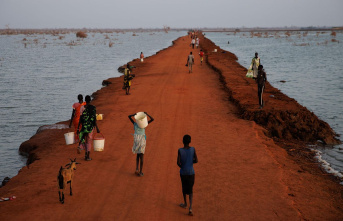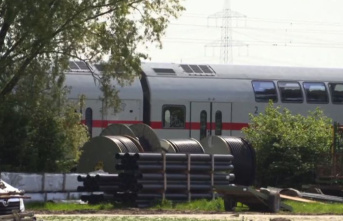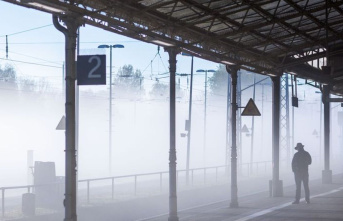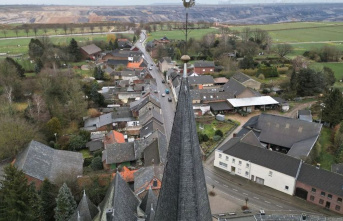The summer of 2022 was also too hot and too dry. In addition, according to preliminary calculations by the German Weather Service, it was the sunniest since records began.
"In times of climate change, we should have experienced what will soon be a typical summer," said meteorologist Uwe Kirsche in Offenbach on Tuesday. Specifically, this year's summer is one of the four warmest in more than 140 years and is the sixth driest summer in this period. The DWD has been recording sunshine duration since 1951, temperatures and precipitation have been recorded since 1881.
heat
"From the start, June already brought the summer into full swing, became a long-distance runner in July and remained so in August," says the weather service. The highest value in Germany was measured on July 20th in Hamburg with 40.1 degrees. According to the provisional summer balance, the average temperature was 19.2 degrees and thus 2.9 degrees above the value of the internationally valid reference period 1961 to 1990. Compared to the warmer reference period 1991 to 2020, the deviation was plus 1.6 degrees.
The last time it was particularly hot was in the summer of 2019 - with an average temperature of 19.2 degrees, it was the third warmest since recording began. Only the summers of 2003 (19.7 degrees) and 2018 (19.3 degrees) were even warmer. However, just looking at average values is not particularly informative, says Andreas Marx, head of the German Drought Monitor at the Helmholtz Center for Environmental Research (UFZ) in Leipzig. "This summer will probably be more hot than 2003." The number of hot days and the intensity of heat waves are increasing.
dryness
Record low levels in rivers, dried out fields, parched meadows and forest fires: the drought made itself felt in many places this summer. According to experts, this is a continuation of a trend that has been apparent for some time. With precipitation of around 145 liters per square meter, it was the sixth driest summer since 1881. According to this, there was almost 40 percent less precipitation than the average for the reference period 1961 to 1990. And there were strong regional differences: while Saarland, Rhineland-Palatinate and Hesse were loud DWD reported a "historic summer drought", more than 500 liters per square meter fell in the Alps.
In agriculture, the drought has shown itself in summer crops such as corn or sugar beets, says Marx from the UFZ. However: "The drought is not just a problem this summer, we have had dry soil for four years." In addition, there is the risk of forest fires: According to the DWD, the number of days with a high to very high forest fire risk index in Germany this summer was similar to that in 2018.
sunshine
There has never been so much sun since meteorologists started collecting the data. In June, July and August, the DWD has almost 820 hours of sunshine nationwide. This is significantly more than the previous record in the summer of 2003 with 793.3 hours.
"Accordingly, it is the sunniest summer since the duration of sunshine has been recorded, i.e. for over 70 years," said DWD meteorologist Andreas Friedrich. On the Upper Rhine, the sun shone for almost 1000 hours in the last three months, in the extreme north it was around 700 hours.
"Dried out rivers and small bodies of water, parched moors and wetlands, more forest fires, crop losses and health problems show that the climate crisis is also having an impact in Germany," says WWF expert Tobias Schäfer - and called on the federal government to act quickly. For example, measures to build up humus in the soil, to convert forests, but also to rewet wetlands and revitalize floodplains are in demand.
"The summer of 2022 is another warning sign that more extreme summers have already become the norm," explains Peter Hoffmann from the Potsdam Institute for Climate Impact Research. They are characterized by more frequent heat waves and prolonged phases without widespread rain. "Of course there are fluctuations from year to year and from place to place. But in principle, unfortunately, no relaxation can be expected in the coming years either."
And what are the prospects for autumn? Based on its seasonal trend, the DWD expects that autumn will also be a little drier than the average for the last 30 years and that it will be about one degree warmer than in recent years. Meteorologist Friedrich says: "With the drought and the low water levels, you can't give the all-clear yet, it can still drag on into autumn."












